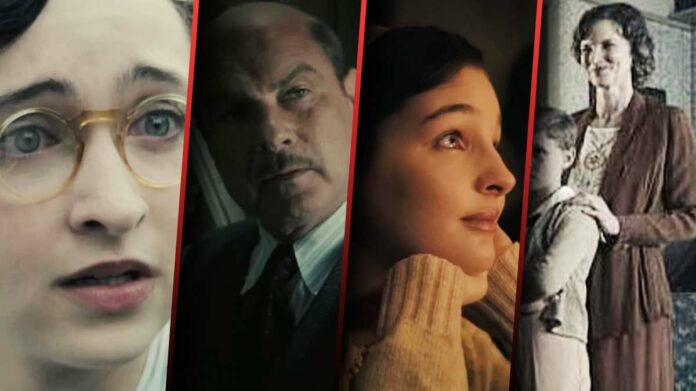The National Geographic production A Small Light skillfully captures the atmosphere of Amsterdam during the 1940s amidst the ongoing turmoil of World War II. Under the watchful and oppressive eye of the Nazis, many Jewish families faced the grave risk of capture and subsequent deportation to death camps. Some managed to find secret shelter within the city, while others sought refuge in hidden locations. Among them were the renowned diarist Anne Frank and her family, who found solace in a secret annex. The series poignantly portrays their harrowing journey and the individuals who aided them, notably Miep Gies, Otto Frank’s secretary, who played a pivotal role in hiding these Jewish families. However, tragedy ultimately befell the Franks and their fellow hiding companions when some Nazi Gestapos raided Otto Frank’s office premises and found the hidden Jews in a secret annex.
Spoilers Ahead
Otto Frank
Born in Frankfurt, Germany, in 1889, Otto Frank’s early life was not focused on business. Otto had served in the Imperial German Army during the First World War. As the Nazi regime rose to power, Otto made the decision to relocate to Amsterdam for a more secure future. With his wife Edith and their daughters Margot and Anne, he settled in Amsterdam and began working at his brother-in-law’s spice and pectin company, Opekta. Eventually, he took over the business and also started other spice ventures like Pectacon.
In A Small Light, Otto Frank is first introduced during an interview with Miep Gies. Recognizing her potential, Otto hired her and became a trustworthy figure and paternal presence in her life. He prioritized his family and displayed a meticulous approach to everything. Otto remained optimistic in difficult situations, seeking solutions rather than succumbing to despair. Despite facing discrimination as a Jew in Amsterdam, Otto endured it with grace. However, as the power of Nazism grew, the situation worsened. To protect his family, Otto decided to move to Amsterdam. With the assistance of Miep, Bep, Kugler, and Kleiman, the Frank family took refuge in a secret annex within the Opekta building. Only a few select individuals knew their true whereabouts.
During their time in hiding, Otto supported Miep in managing the Opekta company. But due to his hardworking and dedicated nature, he didn’t leave the burden solely on her shoulders. Otto placed blind trust in Miep, who repeatedly proved her worth by assisting the Franks during their hiding. He felt immense gratitude towards her for her unwavering support. Sadly, after nearly two years of hiding, their hope for freedom was shattered. The annex was discovered in an unannounced raid by the Nazis, leading to the arrest of the hidden Jews. Otto endured immense loss as his family members were sent to various camps, with his wife Edith and daughters Anne and Margot tragically dying from disease. Returning to Amsterdam after the war, Otto received the remaining memories of his family from Miep. Anne’s diary, which Otto later published, immortalized his daughter and the entire Frank family. Through the diary, Otto discovered a new side of Anne and was grateful for the opportunity to read her thoughts. Despite becoming the sole survivor of his family, Otto continued to battle with accepting this reality. He found solace in the diary and recognized the importance of preserving his daughter’s legacy. Otto Frank’s unflinching strength and dedication to honoring Anne’s memory became a testament to the resilience of the human spirit.
Edith Frank
Born in 1900 in Aachen, Germany, Edith married Otto Frank in 1925 and became a pillar of strength for the Frank family. However, her relationship with her daughter Anne was often strained due to her strict parenting style. Over time, the rift between them began to fade. During the rise of Nazism, when the family went into hiding, Edith initially held onto hope that everything would be fine. She adapted to the abrupt changes in their lifestyle and food habits. But as time passed, Edith started to sink into darkness, experiencing disorientation and deep anxiety. Her mental state deteriorated, and she battled severe depression throughout their two years in hiding. Edith often felt isolated and left out, seeing others go about their normal lives while she remained hidden. Despite her struggles, she gathered herself together for the sake of her children, becoming an inspiration to them by showing that hope can thrive even in the most difficult times. Sadly, after their capture in 1945, Edith lost her life in the Auschwitz Nazi camp. She couldn’t meet her daughters, who had been taken to the Bergen-Belsen Nazi camp. After the war, Otto returned home alone, carrying his wife’s memories with him.
Margot And Anne Frank
Anne and Margot had distinct personalities. Anne, born in 1929 in Frankfurt, was a rebellious and inquisitive spirit with a passion for writing, while Margot was an introverted and anxious one. But she had supported her little sister in all kinds of aspects of life. Anne dreamed of becoming a renowned writer from a young age and had a deep love for nature and animals. Losing her kitten during their evacuation worried her a lot. Anne documented her experiences in her diary, which also revealed her strained relationship with her mother, although Otto Frank chose not to publish all of those parts. Edith’s strict rules often clashed with Anne’s strong-willed nature.
Both Anne and Margot held a deep fondness for Miep, as she was the one who had given them the kitten before the war. Miep played a crucial role in ensuring the safety and well-being of the hidden families, but their peace was shattered when the Nazis discovered their hiding place and sent them to concentration camps. Miep collected Anne’s diary pages from the annex and gave them to Otto upon his return. Sadly, neither Anne nor Margot survived. Anne Frank’s potential as a remarkable writer was tragically never fully realized. Nevertheless, Anne’s diary immortalized her name and continues to inspire hope, resilience, and the pursuit of freedom.

